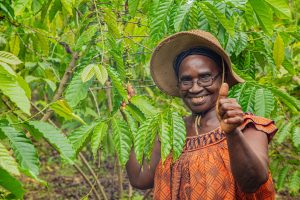
By Scott Coles, Coffee Business Executive Officer for Nestlé Central and West Africa
There is nothing quite like that first cup of coffee in the morning. For me it’s a moment to
gather my thoughts before the day really begins. However, this daily ritual isn’t something we
can take for granted.
Climatologists have warned that without action, coffee farmers in Africa will lose their
livelihoods. So, if we want to keep enjoying that precious cup, we need to ensure our coffee
is sustainably sourced.
Coffee farming in Africa
The continent produces 12% of the world’s coffee, with over ten million farmers across 30
countries. Whilst demand for coffee is forecast to grow significantly, crops have been
declining in Côte d’Ivoire – the largest coffee producer in West Africa.
Nestlé has been manufacturing coffee in Côte d’Ivoire for over 60 years, and we have seen
first-hand the challenges farmers are facing.
Climate change creates rising temperatures, drought and flooding which makes coffee more
difficult to grow. Under this pressure farmers have turned to environmentally harmful
practices such as deforestation and are substituting old coffee trees for crops which are
easier to grow.
The case for sustainable coffee farming and transition to regenerative agriculture
It’s not too late to reverse this decline. On a recent farm visit to the village of Yobouekro, I
saw for myself the impact climate change is having. I met with Amani Ahou, a female coffee
farmer who, until recently planned to abandon her plantation as the crop from her aged trees
had fallen to depressingly low levels.
Over the last few years, Amani has received training from Nescafé agronomists. She has learnt
pruning techniques, composting and the importance of planting shade trees. She is now more
upbeat about the prospect of reviving her coffee farm. ‘My plantation has rejuvenated, my
old trees are starting to flower again, and are producing good coffee’, she said.
It was great to see for myself how improving technical knowledge, building stronger
partnerships between farmers and industry can have a real and lasting impact for farmers like
Amani.
Regenerative agricultural techniques like these play a critical role in the future of coffee
farming. They will improve soil health, restore water cycles, increase biodiversity, and reduce
greenhouse gas emissions. By planting more coffee trees and encouraging greater
biodiversity, farmers can create an environment for bees, insects and birds to thrive on their
farms. This will have a positive impact on the ecosystem and reduce the effects of climate
change.
The responsibility and cost for transitioning to regenerative agriculture cannot lie solely with
the farmers. It’s been 10 years since we launched the Nescafé plan, during this time we have
worked closely with farmers to improve agricultural practices, sharing our knowledge and
expertise from across the planet. The plan buildsfarming skills to help farmers produce higher
quality beans and achieve higher premiums, so they can support their families and contribute
meaningfully to their local communities.
However, we know there is much more to be done, which is why we are going further and
last week announced the Nescafé Plan 2030 to accelerate regenerative agriculture, reduce
greenhouse gas emissions, and improve coffee farmers’ livelihoods.
Nescafé has committed to invest over 1 billion Swiss francs globally. The aims of the plan are:
– 100% of our coffee to be sourced responsibly by 2025
– 20% of coffee sourced from regenerative agricultural methods by 2025 and 50% by
2030.
In Côte d’Ivoire, we are committed to support farmers that take on the risk and costs
associated with transitioning to regenerative agriculture. We will be piloting a financial
scheme which includes conditional cash incentives for adopting regenerative agriculture
practices.
We have a long way to go, but if the whole coffee industry in Africa supports this transition
to regenerative agriculture, we will ensure no farmer is left behind, so we can continue to
uplift lives and livelihoods with every cup we drink.
 DailyrecordNg …Nigeria's hottest news blog
DailyrecordNg …Nigeria's hottest news blog







